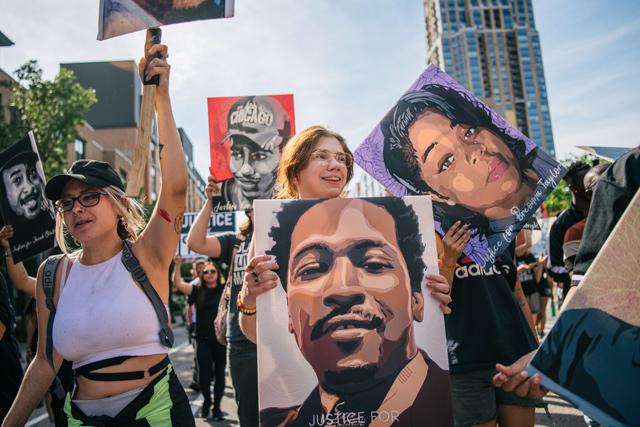You are here
Judge refuses to sequester Floyd trial jury after new unrest
By AFP - Apr 13,2021 - Last updated at Apr 13,2021
MINNEAPOLIS — The judge presiding over the George Floyd murder trial in Minneapolis denied a defence request on Monday to sequester the jury, dismissing suggestions they could be swayed by a night of unrest over the shooting of a young Black man by the city's police.
Hennepin County Judge Peter Cahill said he expected closing arguments to begin next week in the high-profile trial of police officer Derek Chauvin, charged with murdering Floyd last year.
Eric Nelson, Chauvin's lawyer, said he was concerned that the protests in the Minneapolis suburb of Brooklyn Centre over the death of 20-year-old Daunte Wright could influence the nine-woman, five-man jury.
"A verdict in this case is going to have consequences," Nelson said. "Will the jury be confident to make a decision regardless of the potential outcome of their decision?"
Prosecutors opposed the request to sequester the jury and so did the judge.
"This is a totally different case," Cahill said. "I'm not going to sequester them. We'll sequester them on Monday when I anticipate doing closings."
Chauvin is facing murder and manslaughter charges for his role in Floyd’s May 25, 2020 death, which occurred during his arrest for allegedly passing a fake $20 bill.
The 45-year-old Chauvin, who is white, was seen in a video taken by a bystander kneeling on Floyd’s neck for more than nine minutes as the handcuffed 46-year-old Black man complained repeatedly that he “can’t breathe”.
The video touched off protests against racial injustice and police brutality in the United States and around the world.
The latest protests occurred in Brooklyn Centre, a suburb of Minneapolis not far from the heavily guarded Hennepin County Government Centre where Chauvin is on trial.
Police fired tear gas and flash bangs to disperse a crowd of hundreds of people who gathered outside a police station in Brooklyn Centre.
National guard troops were deployed and Brooklyn Centre Mayor Mike Elliott imposed an overnight curfew.
“We want to make sure everyone is safe,” the mayor tweeted. “Please be safe and please go home.”
Wright’s mother told a crowd on Sunday evening that her son had called her to say he had been pulled over by police.
Katie Wright said she heard officers tell her son to put his phone down, and then one of the officers ended the call. Soon after, her son’s girlfriend told her he had been shot.
White House spokeswoman Jen Psaki said the administration was “incredibly saddened to hear about the loss of life at the hands of law enforcement”.
“It is a reminder of the pain, the anger, the trauma, the exhaustion that many communities across the country have felt,” she said.
According to the Brooklyn Centre Police Department, officers pulled over a driver for a traffic violation.
When they discovered he had an outstanding warrant, they tried to take him into custody, the department said in a statement.
He got back into his car, and one of the officers fired their weapon, striking the driver, who died at the scene.
A female passenger in the car suffered “non-life threatening injuries”, the statement said.
John Harrington, Minnesota’s commissioner of public safety, said about 20 businesses were looted at a local mall overnight and additional national guard troops would be deployed on Monday.
Mayor Elliott called the shooting “tragic”, while Minnesota Governor Tim Walz said the state “mourns another life of a Black man taken by law enforcement”.
Tensions in Minneapolis are already high over the Chauvin trial.
Prosecutors are seeking to prove that Floyd’s death was due to asphyxiation by the police officers conducting the arrest and have called several medical experts to bolster their case.
Chauvin’s defense attorney claims Floyd’s death was due to his consumption of the illegal drugs fentanyl and methamphetamine and underlying health conditions.
Prosecutors called a prominent cardiologist, Dr Jonathan Rich, to testify on Monday.
Rich said Floyd’s death was caused by “low oxygen levels” that were “induced by the prone restraint and positional asphyxiation that he was subjected to”.
“I see no evidence at all that a fentanyl overdose caused Mr Floyd’s death,” Rich said.
Related Articles
MINNEAPOLIS — Nine months after George Floyd’s death laid bare the racial wounds in the United States, the white policeman charged with murd
MINNEAPOLIS — Former policeman Derek Chauvin was sentenced to 22 and a half years in prison on Friday for the murder of African American Geo
MINNEAPOLIS — A federal grand jury has charged Derek Chauvin and three other former Minneapolis police officers with civil rights crimes i



















